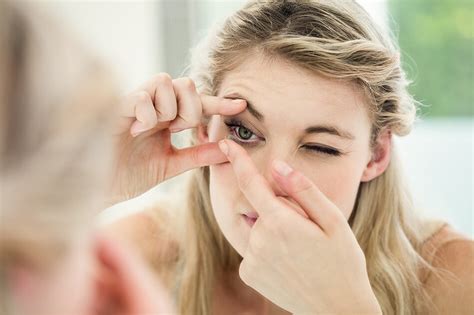Contact lenses are a popular alternative to eyeglasses for correcting vision problems. They offer a wider field of vision, can be more comfortable to wear, and can be less noticeable than glasses. However, it can take some time to get used to wearing contacts. The adjustment period can vary depending on the individual, but most people find that it takes about two to four weeks to get comfortable with their contacts.

Factors that Affect the Adjustment Period
The following factors can affect how long it takes to get used to wearing contacts:
– The type of contact lenses: Soft contact lenses are typically more comfortable and easier to adjust to than hard contact lenses.
– The fit of the contact lenses: Contact lenses that are properly fitted will be more comfortable and easier to wear.
– The wearer’s eye health: People with dry eyes or other eye conditions may find it more difficult to adjust to wearing contacts.
– The wearer’s experience with contact lenses: People who have never worn contact lenses before may find it takes longer to get used to them than those who have worn contacts in the past.
Tips for Getting Used to Contacts
The following tips can help you get used to wearing contacts more quickly:
– Start by wearing your contacts for a few hours each day. Gradually increase the amount of time you wear them as you become more comfortable.
– Be patient. It takes time to get used to wearing contacts. Don’t get discouraged if you don’t feel comfortable with them right away.
– Talk to your eye doctor. If you are having any problems adjusting to your contacts, talk to your eye doctor. They can help you troubleshoot the problem and make sure that your contacts are properly fitted.
Benefits of Wearing Contacts
Contact lenses offer a number of benefits over eyeglasses, including:
– Wider field of vision: Contact lenses provide a wider field of vision than eyeglasses, which can be beneficial for activities such as driving or playing sports.
– More comfortable to wear: Contact lenses can be more comfortable to wear than eyeglasses, especially for people who are active or who wear glasses for long periods of time.
– Less noticeable: Contact lenses are less noticeable than eyeglasses, which can be a benefit for people who want to avoid drawing attention to their vision problems.
Risks of Wearing Contacts
Contact lenses can also pose some risks, including:
– Eye infections: Contact lenses can increase the risk of eye infections, especially if they are not properly cleaned and disinfected.
– Corneal abrasions: Contact lenses can rub against the cornea, the clear outer layer of the eye, and cause abrasions.
– Dry eyes: Contact lenses can make the eyes dry, especially if they are worn for long periods of time.
Table 1. Types of Contact Lenses
| Type of Contact Lens | Description | Advantages | Disadvantages |
|---|---|---|---|
| Soft contact lenses | Made of a soft, flexible material | More comfortable to wear | Can be more difficult to insert and remove |
| Hard contact lenses | Made of a hard, rigid material | More durable | Can be less comfortable to wear |
| Gas permeable contact lenses | Made of a material that allows oxygen to pass through | More comfortable to wear than hard contact lenses | Can be more expensive |
Table 2. Risks of Wearing Contacts
| Risk | Symptoms | Treatment |
|---|---|---|
| Eye infections | Redness, swelling, pain, discharge | Antibiotics |
| Corneal abrasions | Pain, tearing, blurred vision | Eye drops |
| Dry eyes | Burning, itching, redness | Artificial tears |
Table 3. Tips for Getting Used to Contacts
| Tip | Description |
|---|---|
| Start by wearing your contacts for a few hours each day. | This will help your eyes adjust to the contacts. |
| Be patient. | It takes time to get used to wearing contacts. |
| Talk to your eye doctor. | If you are having any problems adjusting to your contacts, talk to your eye doctor. |
Table 4. Benefits of Wearing Contacts
| Benefit | Description |
|---|---|
| Wider field of vision | Contact lenses provide a wider field of vision than eyeglasses. |
| More comfortable to wear | Contact lenses can be more comfortable to wear than eyeglasses, especially for people who are active or who wear glasses for long periods of time. |
| Less noticeable | Contact lenses are less noticeable than eyeglasses. |
Conclusion
Contact lenses can be a great option for people who want to correct their vision without wearing glasses. However, it can take some time to get used to wearing contacts. By following the tips in this article, you can make the adjustment period easier and more comfortable.
